Sustainable Hospitality Management: Environmental and Social Impacts
VerifiedAdded on 2023/02/01
|10
|3299
|45
Report
AI Summary
This report delves into the critical aspects of sustainable hospitality management, emphasizing the importance of corporate responsibility and waste management within the industry. It examines the environmental, economic, and social impacts of waste generation, including the effects of landfill sites, incineration, and both biodegradable and non-biodegradable waste. The report analyzes key strategies and policies adopted by the hospitality sector to mitigate these impacts, such as reducing waste through bulk purchasing and avoiding bottled water. It also explores the economic incentives, brand image benefits, and guest experience improvements associated with sustainable practices. The report highlights the need for sustainable development to balance economic growth with environmental protection and social equity, ultimately aiming to improve community health and lifestyle through reduced waste and the adoption of eco-friendly practices. Strategies such as reducing waste, reusing materials, and recycling are discussed as essential components of a comprehensive sustainability approach. The document is contributed by a student to be published on the website Desklib, a platform providing AI-based study tools.

Sustainable hospitality
management
management
Paraphrase This Document
Need a fresh take? Get an instant paraphrase of this document with our AI Paraphraser
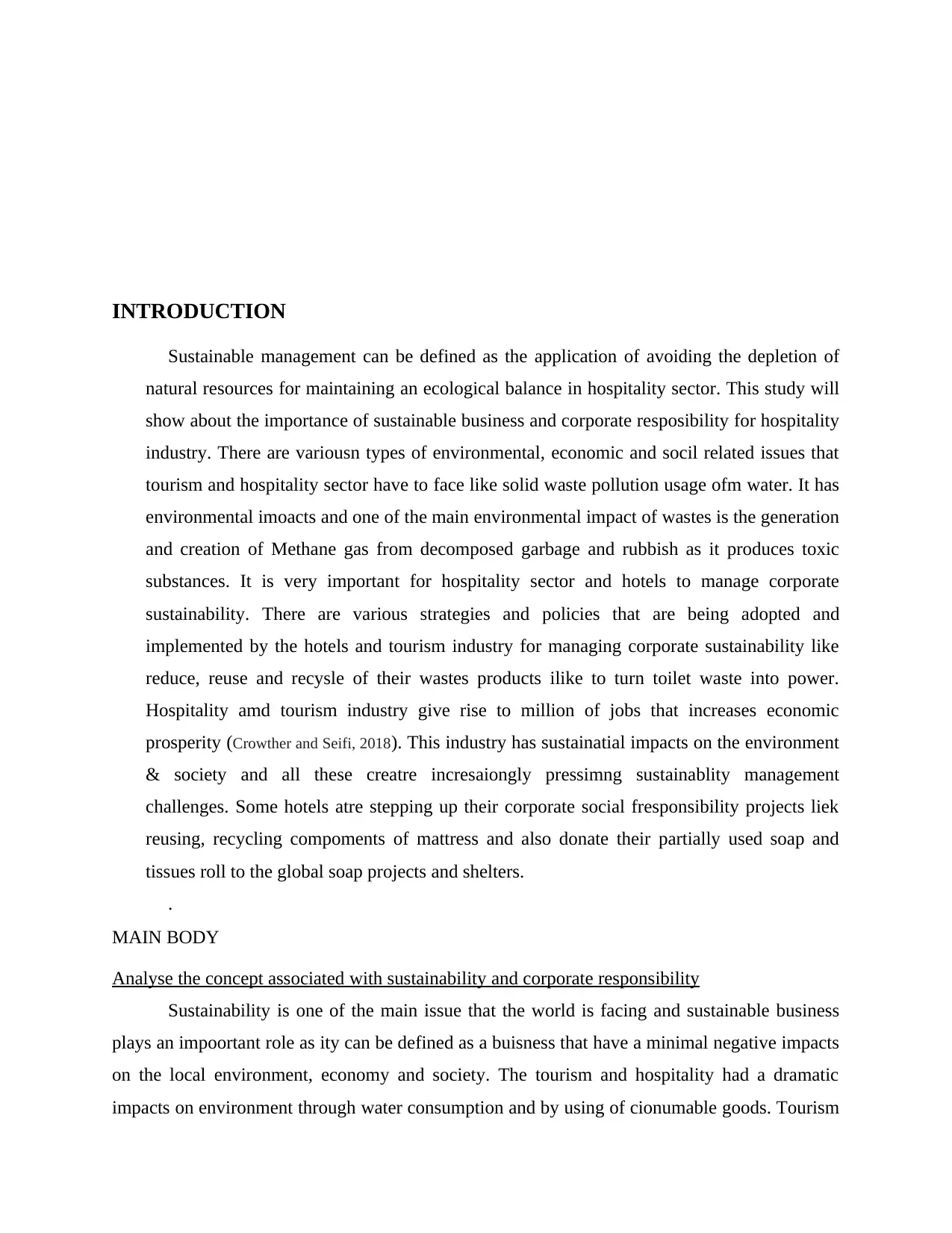
INTRODUCTION
Sustainable management can be defined as the application of avoiding the depletion of
natural resources for maintaining an ecological balance in hospitality sector. This study will
show about the importance of sustainable business and corporate resposibility for hospitality
industry. There are variousn types of environmental, economic and socil related issues that
tourism and hospitality sector have to face like solid waste pollution usage ofm water. It has
environmental imoacts and one of the main environmental impact of wastes is the generation
and creation of Methane gas from decomposed garbage and rubbish as it produces toxic
substances. It is very important for hospitality sector and hotels to manage corporate
sustainability. There are various strategies and policies that are being adopted and
implemented by the hotels and tourism industry for managing corporate sustainability like
reduce, reuse and recysle of their wastes products ilike to turn toilet waste into power.
Hospitality amd tourism industry give rise to million of jobs that increases economic
prosperity (Crowther and Seifi, 2018). This industry has sustainatial impacts on the environment
& society and all these creatre incresaiongly pressimng sustainablity management
challenges. Some hotels atre stepping up their corporate social fresponsibility projects liek
reusing, recycling compoments of mattress and also donate their partially used soap and
tissues roll to the global soap projects and shelters.
.
MAIN BODY
Analyse the concept associated with sustainability and corporate responsibility
Sustainability is one of the main issue that the world is facing and sustainable business
plays an impoortant role as ity can be defined as a buisness that have a minimal negative impacts
on the local environment, economy and society. The tourism and hospitality had a dramatic
impacts on environment through water consumption and by using of cionumable goods. Tourism
Sustainable management can be defined as the application of avoiding the depletion of
natural resources for maintaining an ecological balance in hospitality sector. This study will
show about the importance of sustainable business and corporate resposibility for hospitality
industry. There are variousn types of environmental, economic and socil related issues that
tourism and hospitality sector have to face like solid waste pollution usage ofm water. It has
environmental imoacts and one of the main environmental impact of wastes is the generation
and creation of Methane gas from decomposed garbage and rubbish as it produces toxic
substances. It is very important for hospitality sector and hotels to manage corporate
sustainability. There are various strategies and policies that are being adopted and
implemented by the hotels and tourism industry for managing corporate sustainability like
reduce, reuse and recysle of their wastes products ilike to turn toilet waste into power.
Hospitality amd tourism industry give rise to million of jobs that increases economic
prosperity (Crowther and Seifi, 2018). This industry has sustainatial impacts on the environment
& society and all these creatre incresaiongly pressimng sustainablity management
challenges. Some hotels atre stepping up their corporate social fresponsibility projects liek
reusing, recycling compoments of mattress and also donate their partially used soap and
tissues roll to the global soap projects and shelters.
.
MAIN BODY
Analyse the concept associated with sustainability and corporate responsibility
Sustainability is one of the main issue that the world is facing and sustainable business
plays an impoortant role as ity can be defined as a buisness that have a minimal negative impacts
on the local environment, economy and society. The tourism and hospitality had a dramatic
impacts on environment through water consumption and by using of cionumable goods. Tourism
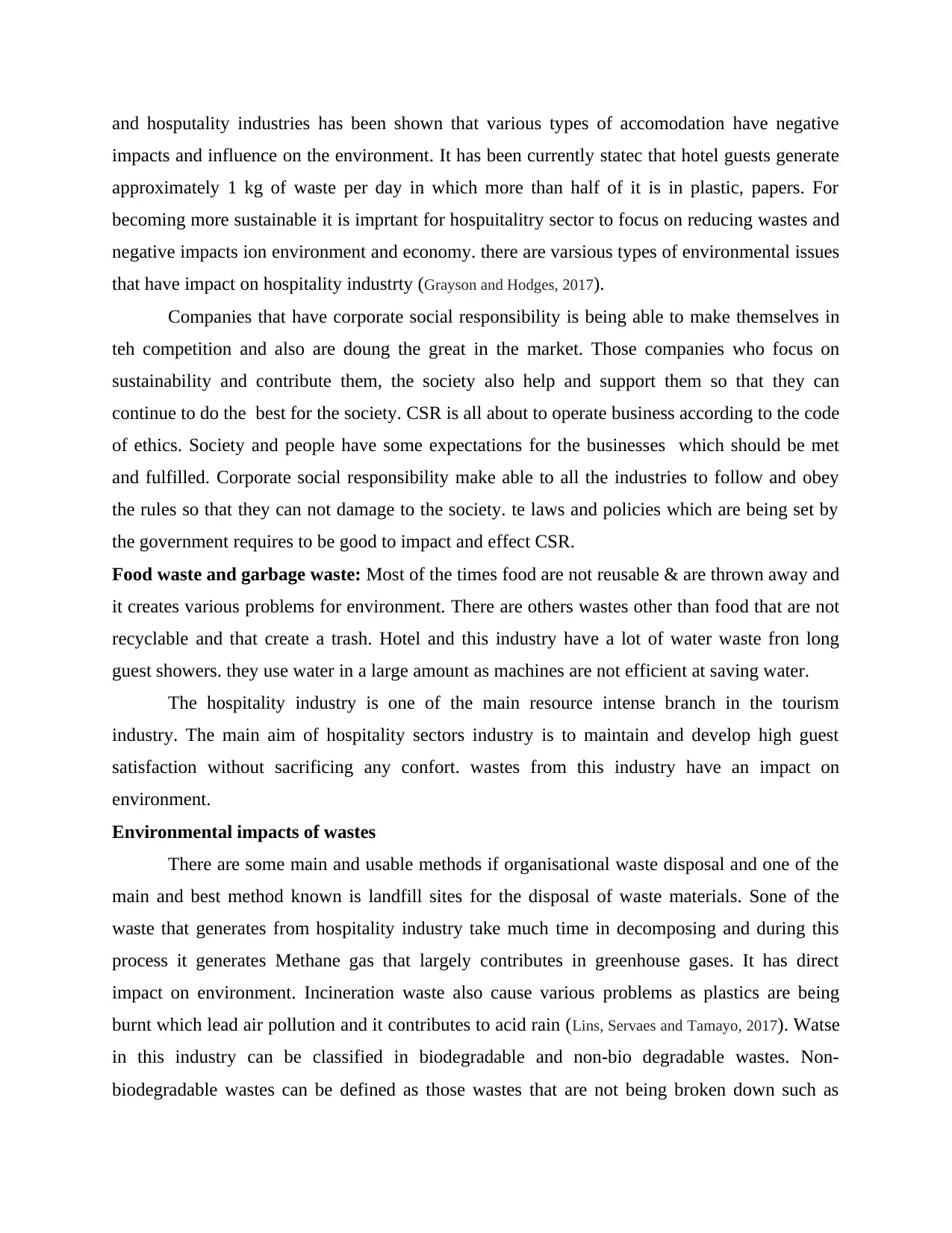
and hosputality industries has been shown that various types of accomodation have negative
impacts and influence on the environment. It has been currently statec that hotel guests generate
approximately 1 kg of waste per day in which more than half of it is in plastic, papers. For
becoming more sustainable it is imprtant for hospuitalitry sector to focus on reducing wastes and
negative impacts ion environment and economy. there are varsious types of environmental issues
that have impact on hospitality industrty (Grayson and Hodges, 2017).
Companies that have corporate social responsibility is being able to make themselves in
teh competition and also are doung the great in the market. Those companies who focus on
sustainability and contribute them, the society also help and support them so that they can
continue to do the best for the society. CSR is all about to operate business according to the code
of ethics. Society and people have some expectations for the businesses which should be met
and fulfilled. Corporate social responsibility make able to all the industries to follow and obey
the rules so that they can not damage to the society. te laws and policies which are being set by
the government requires to be good to impact and effect CSR.
Food waste and garbage waste: Most of the times food are not reusable & are thrown away and
it creates various problems for environment. There are others wastes other than food that are not
recyclable and that create a trash. Hotel and this industry have a lot of water waste fron long
guest showers. they use water in a large amount as machines are not efficient at saving water.
The hospitality industry is one of the main resource intense branch in the tourism
industry. The main aim of hospitality sectors industry is to maintain and develop high guest
satisfaction without sacrificing any confort. wastes from this industry have an impact on
environment.
Environmental impacts of wastes
There are some main and usable methods if organisational waste disposal and one of the
main and best method known is landfill sites for the disposal of waste materials. Sone of the
waste that generates from hospitality industry take much time in decomposing and during this
process it generates Methane gas that largely contributes in greenhouse gases. It has direct
impact on environment. Incineration waste also cause various problems as plastics are being
burnt which lead air pollution and it contributes to acid rain (Lins, Servaes and Tamayo, 2017). Watse
in this industry can be classified in biodegradable and non-bio degradable wastes. Non-
biodegradable wastes can be defined as those wastes that are not being broken down such as
impacts and influence on the environment. It has been currently statec that hotel guests generate
approximately 1 kg of waste per day in which more than half of it is in plastic, papers. For
becoming more sustainable it is imprtant for hospuitalitry sector to focus on reducing wastes and
negative impacts ion environment and economy. there are varsious types of environmental issues
that have impact on hospitality industrty (Grayson and Hodges, 2017).
Companies that have corporate social responsibility is being able to make themselves in
teh competition and also are doung the great in the market. Those companies who focus on
sustainability and contribute them, the society also help and support them so that they can
continue to do the best for the society. CSR is all about to operate business according to the code
of ethics. Society and people have some expectations for the businesses which should be met
and fulfilled. Corporate social responsibility make able to all the industries to follow and obey
the rules so that they can not damage to the society. te laws and policies which are being set by
the government requires to be good to impact and effect CSR.
Food waste and garbage waste: Most of the times food are not reusable & are thrown away and
it creates various problems for environment. There are others wastes other than food that are not
recyclable and that create a trash. Hotel and this industry have a lot of water waste fron long
guest showers. they use water in a large amount as machines are not efficient at saving water.
The hospitality industry is one of the main resource intense branch in the tourism
industry. The main aim of hospitality sectors industry is to maintain and develop high guest
satisfaction without sacrificing any confort. wastes from this industry have an impact on
environment.
Environmental impacts of wastes
There are some main and usable methods if organisational waste disposal and one of the
main and best method known is landfill sites for the disposal of waste materials. Sone of the
waste that generates from hospitality industry take much time in decomposing and during this
process it generates Methane gas that largely contributes in greenhouse gases. It has direct
impact on environment. Incineration waste also cause various problems as plastics are being
burnt which lead air pollution and it contributes to acid rain (Lins, Servaes and Tamayo, 2017). Watse
in this industry can be classified in biodegradable and non-bio degradable wastes. Non-
biodegradable wastes can be defined as those wastes that are not being broken down such as
⊘ This is a preview!⊘
Do you want full access?
Subscribe today to unlock all pages.

Trusted by 1+ million students worldwide
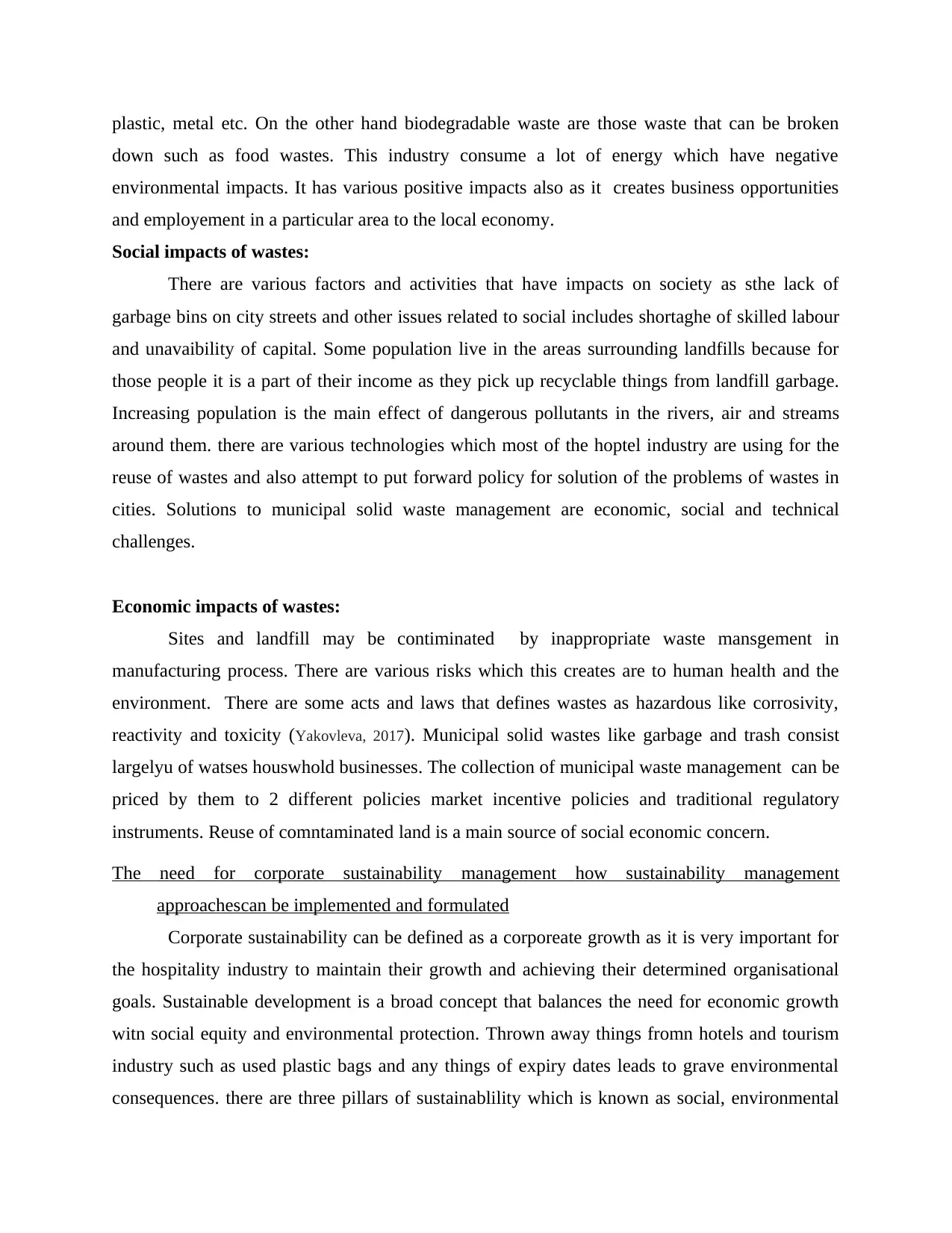
plastic, metal etc. On the other hand biodegradable waste are those waste that can be broken
down such as food wastes. This industry consume a lot of energy which have negative
environmental impacts. It has various positive impacts also as it creates business opportunities
and employement in a particular area to the local economy.
Social impacts of wastes:
There are various factors and activities that have impacts on society as sthe lack of
garbage bins on city streets and other issues related to social includes shortaghe of skilled labour
and unavaibility of capital. Some population live in the areas surrounding landfills because for
those people it is a part of their income as they pick up recyclable things from landfill garbage.
Increasing population is the main effect of dangerous pollutants in the rivers, air and streams
around them. there are various technologies which most of the hoptel industry are using for the
reuse of wastes and also attempt to put forward policy for solution of the problems of wastes in
cities. Solutions to municipal solid waste management are economic, social and technical
challenges.
Economic impacts of wastes:
Sites and landfill may be contiminated by inappropriate waste mansgement in
manufacturing process. There are various risks which this creates are to human health and the
environment. There are some acts and laws that defines wastes as hazardous like corrosivity,
reactivity and toxicity (Yakovleva, 2017). Municipal solid wastes like garbage and trash consist
largelyu of watses houswhold businesses. The collection of municipal waste management can be
priced by them to 2 different policies market incentive policies and traditional regulatory
instruments. Reuse of comntaminated land is a main source of social economic concern.
The need for corporate sustainability management how sustainability management
approachescan be implemented and formulated
Corporate sustainability can be defined as a corporeate growth as it is very important for
the hospitality industry to maintain their growth and achieving their determined organisational
goals. Sustainable development is a broad concept that balances the need for economic growth
witn social equity and environmental protection. Thrown away things fromn hotels and tourism
industry such as used plastic bags and any things of expiry dates leads to grave environmental
consequences. there are three pillars of sustainablility which is known as social, environmental
down such as food wastes. This industry consume a lot of energy which have negative
environmental impacts. It has various positive impacts also as it creates business opportunities
and employement in a particular area to the local economy.
Social impacts of wastes:
There are various factors and activities that have impacts on society as sthe lack of
garbage bins on city streets and other issues related to social includes shortaghe of skilled labour
and unavaibility of capital. Some population live in the areas surrounding landfills because for
those people it is a part of their income as they pick up recyclable things from landfill garbage.
Increasing population is the main effect of dangerous pollutants in the rivers, air and streams
around them. there are various technologies which most of the hoptel industry are using for the
reuse of wastes and also attempt to put forward policy for solution of the problems of wastes in
cities. Solutions to municipal solid waste management are economic, social and technical
challenges.
Economic impacts of wastes:
Sites and landfill may be contiminated by inappropriate waste mansgement in
manufacturing process. There are various risks which this creates are to human health and the
environment. There are some acts and laws that defines wastes as hazardous like corrosivity,
reactivity and toxicity (Yakovleva, 2017). Municipal solid wastes like garbage and trash consist
largelyu of watses houswhold businesses. The collection of municipal waste management can be
priced by them to 2 different policies market incentive policies and traditional regulatory
instruments. Reuse of comntaminated land is a main source of social economic concern.
The need for corporate sustainability management how sustainability management
approachescan be implemented and formulated
Corporate sustainability can be defined as a corporeate growth as it is very important for
the hospitality industry to maintain their growth and achieving their determined organisational
goals. Sustainable development is a broad concept that balances the need for economic growth
witn social equity and environmental protection. Thrown away things fromn hotels and tourism
industry such as used plastic bags and any things of expiry dates leads to grave environmental
consequences. there are three pillars of sustainablility which is known as social, environmental
Paraphrase This Document
Need a fresh take? Get an instant paraphrase of this document with our AI Paraphraser
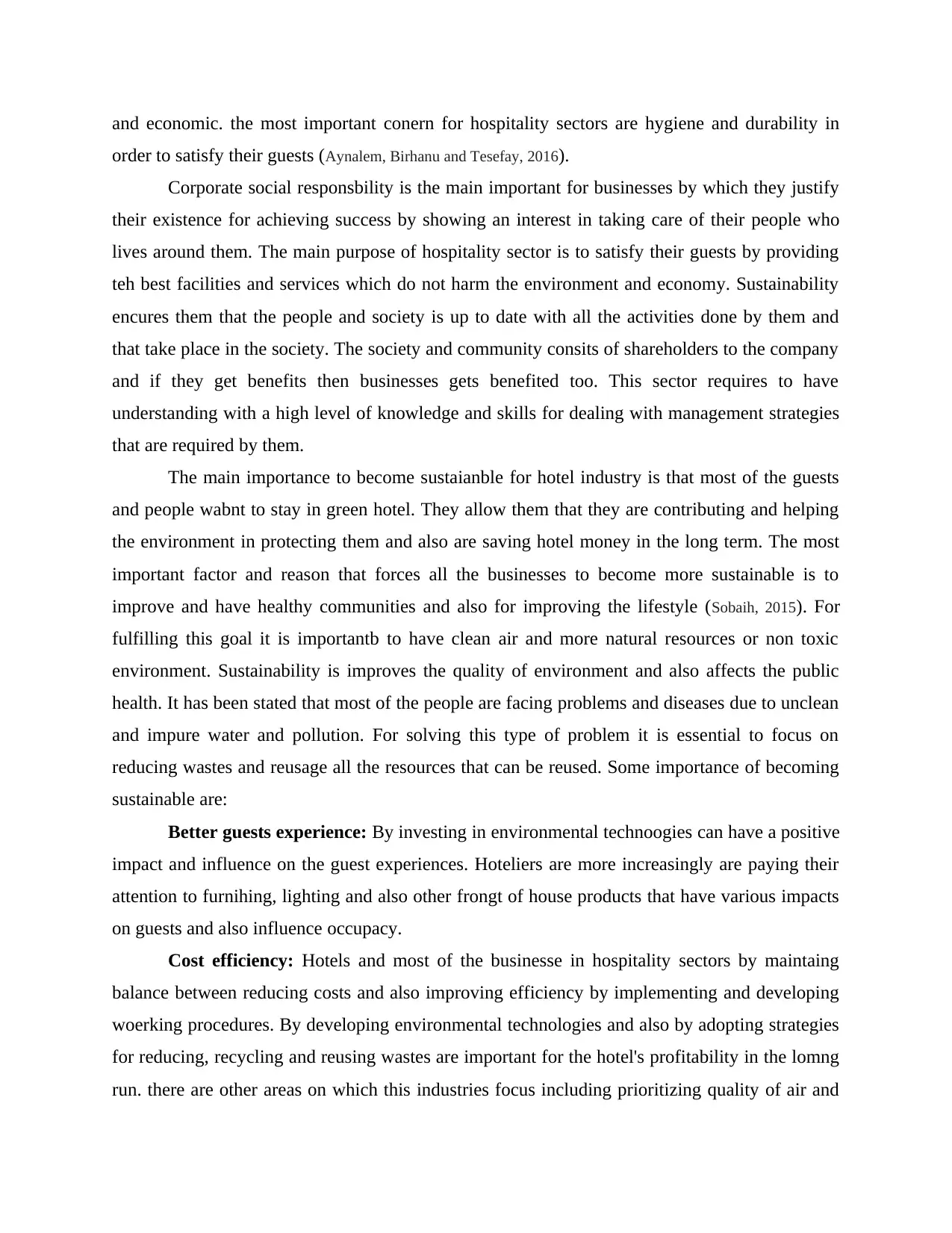
and economic. the most important conern for hospitality sectors are hygiene and durability in
order to satisfy their guests (Aynalem, Birhanu and Tesefay, 2016).
Corporate social responsbility is the main important for businesses by which they justify
their existence for achieving success by showing an interest in taking care of their people who
lives around them. The main purpose of hospitality sector is to satisfy their guests by providing
teh best facilities and services which do not harm the environment and economy. Sustainability
encures them that the people and society is up to date with all the activities done by them and
that take place in the society. The society and community consits of shareholders to the company
and if they get benefits then businesses gets benefited too. This sector requires to have
understanding with a high level of knowledge and skills for dealing with management strategies
that are required by them.
The main importance to become sustaianble for hotel industry is that most of the guests
and people wabnt to stay in green hotel. They allow them that they are contributing and helping
the environment in protecting them and also are saving hotel money in the long term. The most
important factor and reason that forces all the businesses to become more sustainable is to
improve and have healthy communities and also for improving the lifestyle (Sobaih, 2015). For
fulfilling this goal it is importantb to have clean air and more natural resources or non toxic
environment. Sustainability is improves the quality of environment and also affects the public
health. It has been stated that most of the people are facing problems and diseases due to unclean
and impure water and pollution. For solving this type of problem it is essential to focus on
reducing wastes and reusage all the resources that can be reused. Some importance of becoming
sustainable are:
Better guests experience: By investing in environmental technoogies can have a positive
impact and influence on the guest experiences. Hoteliers are more increasingly are paying their
attention to furnihing, lighting and also other frongt of house products that have various impacts
on guests and also influence occupacy.
Cost efficiency: Hotels and most of the businesse in hospitality sectors by maintaing
balance between reducing costs and also improving efficiency by implementing and developing
woerking procedures. By developing environmental technologies and also by adopting strategies
for reducing, recycling and reusing wastes are important for the hotel's profitability in the lomng
run. there are other areas on which this industries focus including prioritizing quality of air and
order to satisfy their guests (Aynalem, Birhanu and Tesefay, 2016).
Corporate social responsbility is the main important for businesses by which they justify
their existence for achieving success by showing an interest in taking care of their people who
lives around them. The main purpose of hospitality sector is to satisfy their guests by providing
teh best facilities and services which do not harm the environment and economy. Sustainability
encures them that the people and society is up to date with all the activities done by them and
that take place in the society. The society and community consits of shareholders to the company
and if they get benefits then businesses gets benefited too. This sector requires to have
understanding with a high level of knowledge and skills for dealing with management strategies
that are required by them.
The main importance to become sustaianble for hotel industry is that most of the guests
and people wabnt to stay in green hotel. They allow them that they are contributing and helping
the environment in protecting them and also are saving hotel money in the long term. The most
important factor and reason that forces all the businesses to become more sustainable is to
improve and have healthy communities and also for improving the lifestyle (Sobaih, 2015). For
fulfilling this goal it is importantb to have clean air and more natural resources or non toxic
environment. Sustainability is improves the quality of environment and also affects the public
health. It has been stated that most of the people are facing problems and diseases due to unclean
and impure water and pollution. For solving this type of problem it is essential to focus on
reducing wastes and reusage all the resources that can be reused. Some importance of becoming
sustainable are:
Better guests experience: By investing in environmental technoogies can have a positive
impact and influence on the guest experiences. Hoteliers are more increasingly are paying their
attention to furnihing, lighting and also other frongt of house products that have various impacts
on guests and also influence occupacy.
Cost efficiency: Hotels and most of the businesse in hospitality sectors by maintaing
balance between reducing costs and also improving efficiency by implementing and developing
woerking procedures. By developing environmental technologies and also by adopting strategies
for reducing, recycling and reusing wastes are important for the hotel's profitability in the lomng
run. there are other areas on which this industries focus including prioritizing quality of air and
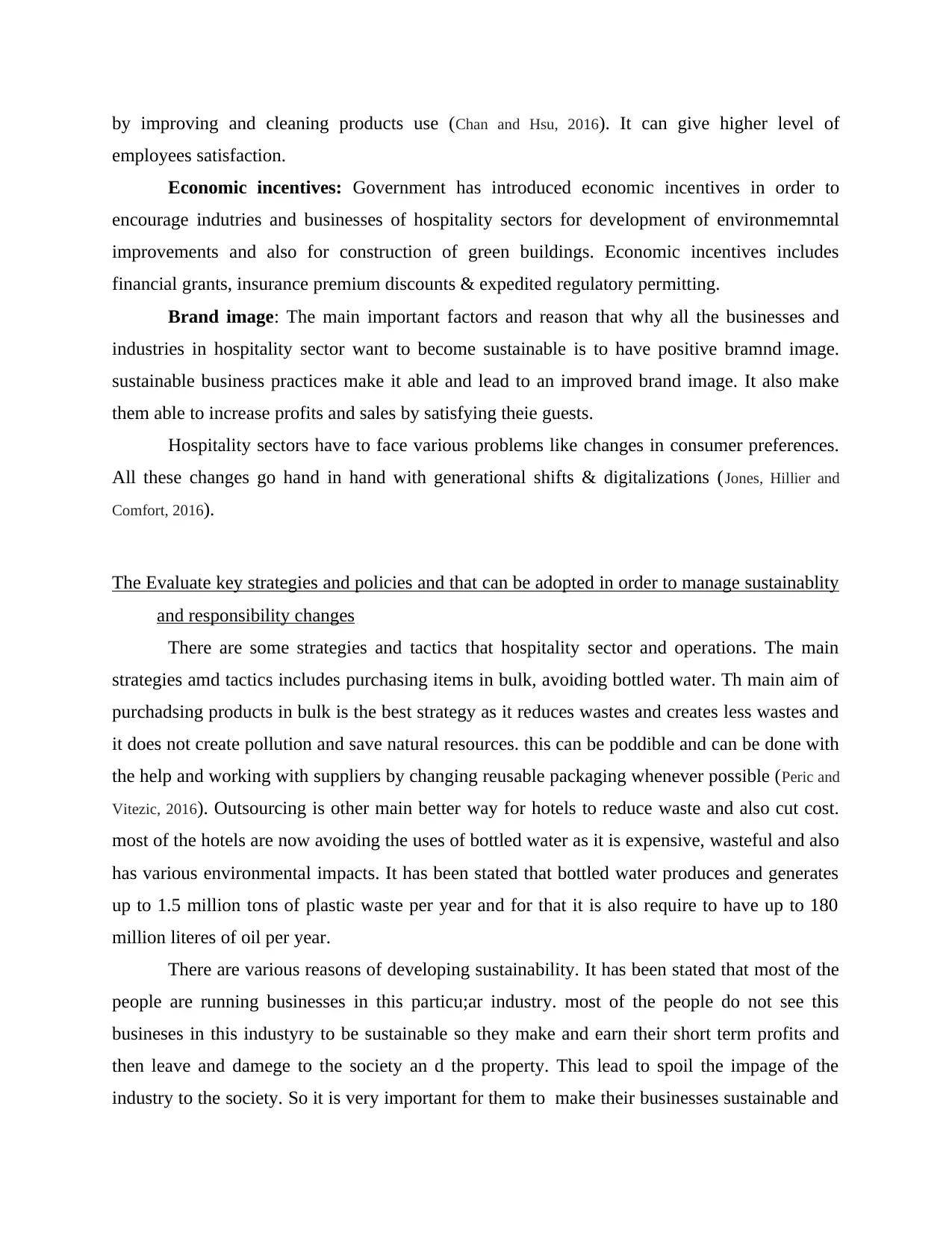
by improving and cleaning products use (Chan and Hsu, 2016). It can give higher level of
employees satisfaction.
Economic incentives: Government has introduced economic incentives in order to
encourage indutries and businesses of hospitality sectors for development of environmemntal
improvements and also for construction of green buildings. Economic incentives includes
financial grants, insurance premium discounts & expedited regulatory permitting.
Brand image: The main important factors and reason that why all the businesses and
industries in hospitality sector want to become sustainable is to have positive bramnd image.
sustainable business practices make it able and lead to an improved brand image. It also make
them able to increase profits and sales by satisfying theie guests.
Hospitality sectors have to face various problems like changes in consumer preferences.
All these changes go hand in hand with generational shifts & digitalizations (Jones, Hillier and
Comfort, 2016).
The Evaluate key strategies and policies and that can be adopted in order to manage sustainablity
and responsibility changes
There are some strategies and tactics that hospitality sector and operations. The main
strategies amd tactics includes purchasing items in bulk, avoiding bottled water. Th main aim of
purchadsing products in bulk is the best strategy as it reduces wastes and creates less wastes and
it does not create pollution and save natural resources. this can be poddible and can be done with
the help and working with suppliers by changing reusable packaging whenever possible (Peric and
Vitezic, 2016). Outsourcing is other main better way for hotels to reduce waste and also cut cost.
most of the hotels are now avoiding the uses of bottled water as it is expensive, wasteful and also
has various environmental impacts. It has been stated that bottled water produces and generates
up to 1.5 million tons of plastic waste per year and for that it is also require to have up to 180
million literes of oil per year.
There are various reasons of developing sustainability. It has been stated that most of the
people are running businesses in this particu;ar industry. most of the people do not see this
busineses in this industyry to be sustainable so they make and earn their short term profits and
then leave and damege to the society an d the property. This lead to spoil the impage of the
industry to the society. So it is very important for them to make their businesses sustainable and
employees satisfaction.
Economic incentives: Government has introduced economic incentives in order to
encourage indutries and businesses of hospitality sectors for development of environmemntal
improvements and also for construction of green buildings. Economic incentives includes
financial grants, insurance premium discounts & expedited regulatory permitting.
Brand image: The main important factors and reason that why all the businesses and
industries in hospitality sector want to become sustainable is to have positive bramnd image.
sustainable business practices make it able and lead to an improved brand image. It also make
them able to increase profits and sales by satisfying theie guests.
Hospitality sectors have to face various problems like changes in consumer preferences.
All these changes go hand in hand with generational shifts & digitalizations (Jones, Hillier and
Comfort, 2016).
The Evaluate key strategies and policies and that can be adopted in order to manage sustainablity
and responsibility changes
There are some strategies and tactics that hospitality sector and operations. The main
strategies amd tactics includes purchasing items in bulk, avoiding bottled water. Th main aim of
purchadsing products in bulk is the best strategy as it reduces wastes and creates less wastes and
it does not create pollution and save natural resources. this can be poddible and can be done with
the help and working with suppliers by changing reusable packaging whenever possible (Peric and
Vitezic, 2016). Outsourcing is other main better way for hotels to reduce waste and also cut cost.
most of the hotels are now avoiding the uses of bottled water as it is expensive, wasteful and also
has various environmental impacts. It has been stated that bottled water produces and generates
up to 1.5 million tons of plastic waste per year and for that it is also require to have up to 180
million literes of oil per year.
There are various reasons of developing sustainability. It has been stated that most of the
people are running businesses in this particu;ar industry. most of the people do not see this
busineses in this industyry to be sustainable so they make and earn their short term profits and
then leave and damege to the society an d the property. This lead to spoil the impage of the
industry to the society. So it is very important for them to make their businesses sustainable and
⊘ This is a preview!⊘
Do you want full access?
Subscribe today to unlock all pages.

Trusted by 1+ million students worldwide
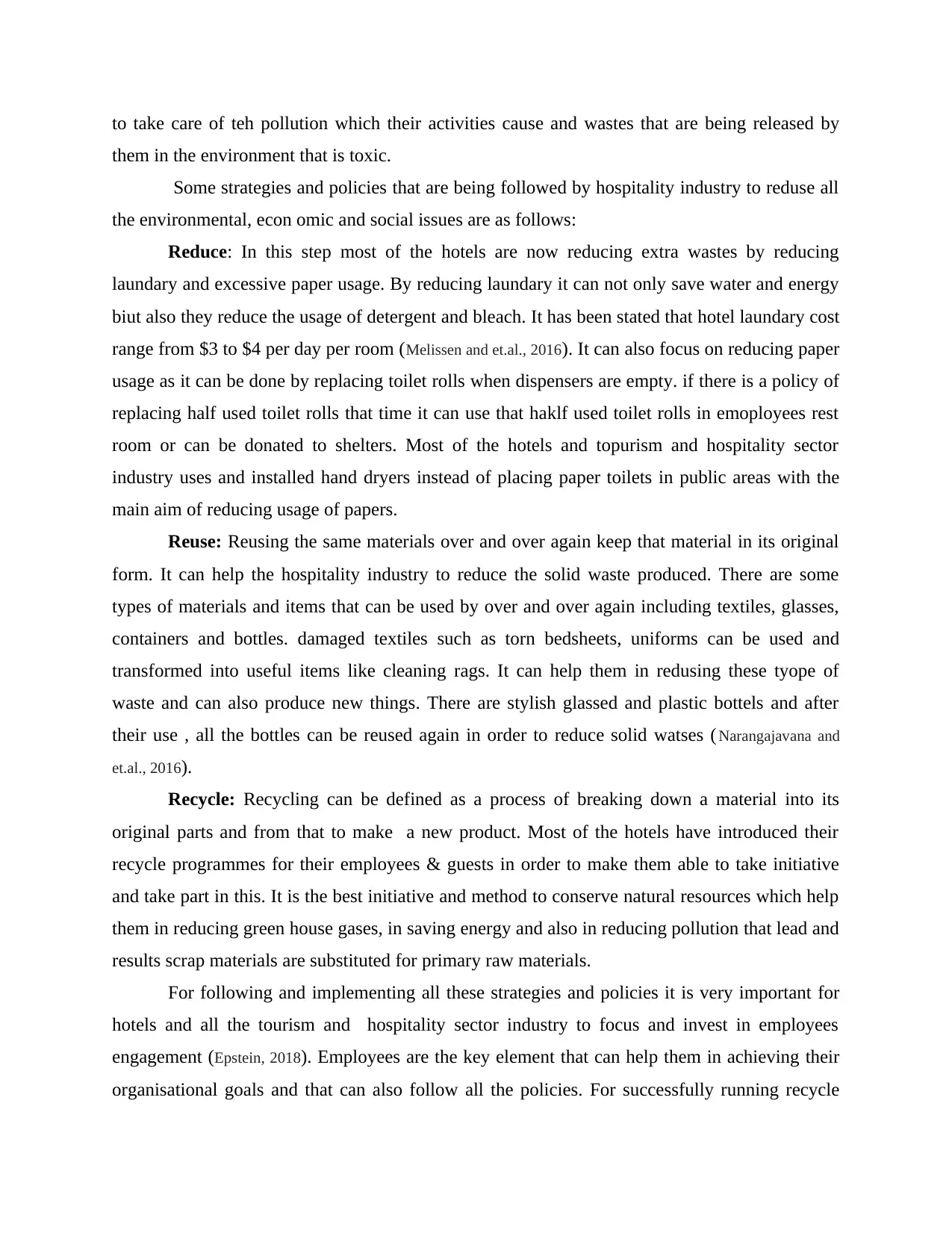
to take care of teh pollution which their activities cause and wastes that are being released by
them in the environment that is toxic.
Some strategies and policies that are being followed by hospitality industry to reduse all
the environmental, econ omic and social issues are as follows:
Reduce: In this step most of the hotels are now reducing extra wastes by reducing
laundary and excessive paper usage. By reducing laundary it can not only save water and energy
biut also they reduce the usage of detergent and bleach. It has been stated that hotel laundary cost
range from $3 to $4 per day per room (Melissen and et.al., 2016). It can also focus on reducing paper
usage as it can be done by replacing toilet rolls when dispensers are empty. if there is a policy of
replacing half used toilet rolls that time it can use that haklf used toilet rolls in emoployees rest
room or can be donated to shelters. Most of the hotels and topurism and hospitality sector
industry uses and installed hand dryers instead of placing paper toilets in public areas with the
main aim of reducing usage of papers.
Reuse: Reusing the same materials over and over again keep that material in its original
form. It can help the hospitality industry to reduce the solid waste produced. There are some
types of materials and items that can be used by over and over again including textiles, glasses,
containers and bottles. damaged textiles such as torn bedsheets, uniforms can be used and
transformed into useful items like cleaning rags. It can help them in redusing these tyope of
waste and can also produce new things. There are stylish glassed and plastic bottels and after
their use , all the bottles can be reused again in order to reduce solid watses ( Narangajavana and
et.al., 2016).
Recycle: Recycling can be defined as a process of breaking down a material into its
original parts and from that to make a new product. Most of the hotels have introduced their
recycle programmes for their employees & guests in order to make them able to take initiative
and take part in this. It is the best initiative and method to conserve natural resources which help
them in reducing green house gases, in saving energy and also in reducing pollution that lead and
results scrap materials are substituted for primary raw materials.
For following and implementing all these strategies and policies it is very important for
hotels and all the tourism and hospitality sector industry to focus and invest in employees
engagement (Epstein, 2018). Employees are the key element that can help them in achieving their
organisational goals and that can also follow all the policies. For successfully running recycle
them in the environment that is toxic.
Some strategies and policies that are being followed by hospitality industry to reduse all
the environmental, econ omic and social issues are as follows:
Reduce: In this step most of the hotels are now reducing extra wastes by reducing
laundary and excessive paper usage. By reducing laundary it can not only save water and energy
biut also they reduce the usage of detergent and bleach. It has been stated that hotel laundary cost
range from $3 to $4 per day per room (Melissen and et.al., 2016). It can also focus on reducing paper
usage as it can be done by replacing toilet rolls when dispensers are empty. if there is a policy of
replacing half used toilet rolls that time it can use that haklf used toilet rolls in emoployees rest
room or can be donated to shelters. Most of the hotels and topurism and hospitality sector
industry uses and installed hand dryers instead of placing paper toilets in public areas with the
main aim of reducing usage of papers.
Reuse: Reusing the same materials over and over again keep that material in its original
form. It can help the hospitality industry to reduce the solid waste produced. There are some
types of materials and items that can be used by over and over again including textiles, glasses,
containers and bottles. damaged textiles such as torn bedsheets, uniforms can be used and
transformed into useful items like cleaning rags. It can help them in redusing these tyope of
waste and can also produce new things. There are stylish glassed and plastic bottels and after
their use , all the bottles can be reused again in order to reduce solid watses ( Narangajavana and
et.al., 2016).
Recycle: Recycling can be defined as a process of breaking down a material into its
original parts and from that to make a new product. Most of the hotels have introduced their
recycle programmes for their employees & guests in order to make them able to take initiative
and take part in this. It is the best initiative and method to conserve natural resources which help
them in reducing green house gases, in saving energy and also in reducing pollution that lead and
results scrap materials are substituted for primary raw materials.
For following and implementing all these strategies and policies it is very important for
hotels and all the tourism and hospitality sector industry to focus and invest in employees
engagement (Epstein, 2018). Employees are the key element that can help them in achieving their
organisational goals and that can also follow all the policies. For successfully running recycle
Paraphrase This Document
Need a fresh take? Get an instant paraphrase of this document with our AI Paraphraser
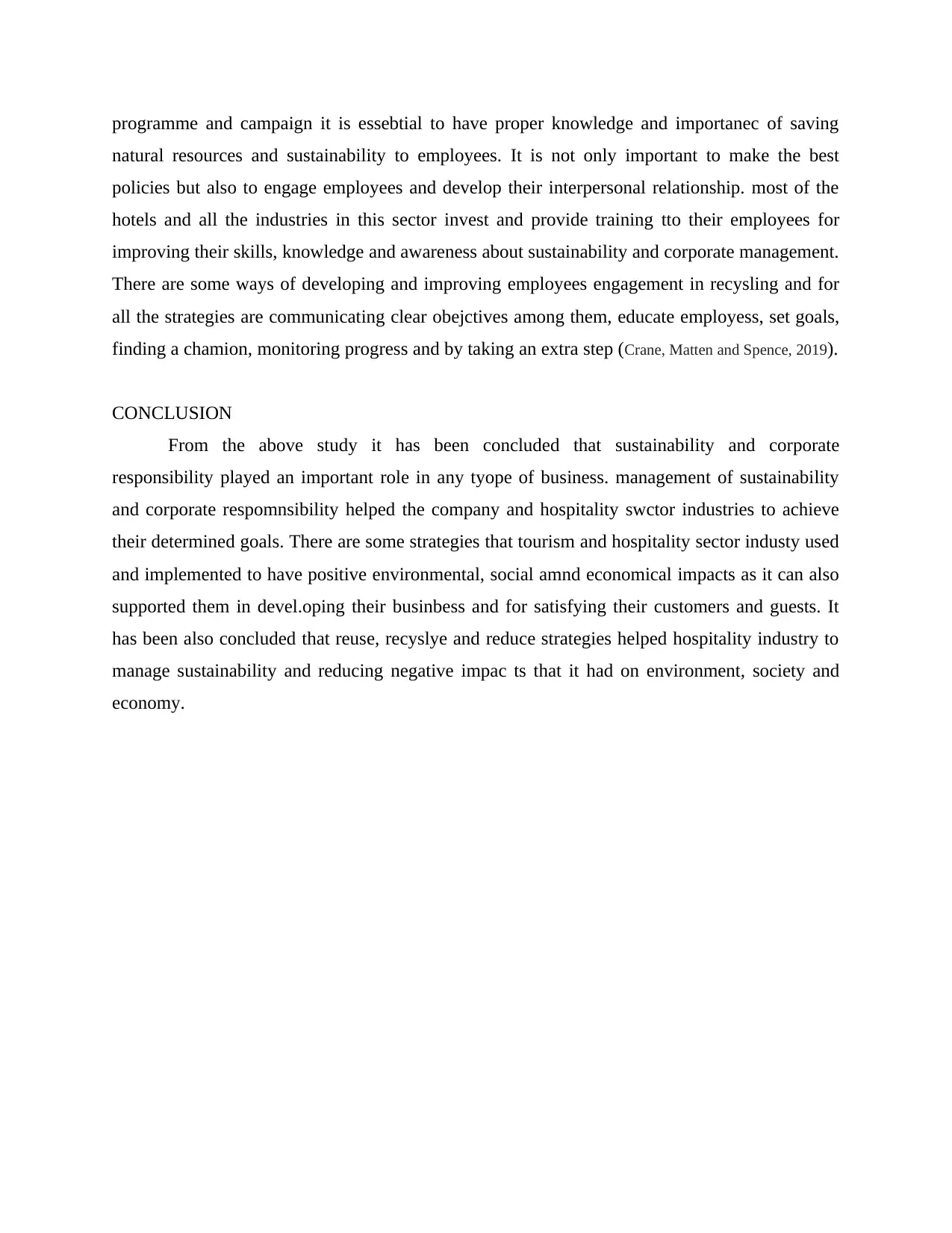
programme and campaign it is essebtial to have proper knowledge and importanec of saving
natural resources and sustainability to employees. It is not only important to make the best
policies but also to engage employees and develop their interpersonal relationship. most of the
hotels and all the industries in this sector invest and provide training tto their employees for
improving their skills, knowledge and awareness about sustainability and corporate management.
There are some ways of developing and improving employees engagement in recysling and for
all the strategies are communicating clear obejctives among them, educate employess, set goals,
finding a chamion, monitoring progress and by taking an extra step (Crane, Matten and Spence, 2019).
CONCLUSION
From the above study it has been concluded that sustainability and corporate
responsibility played an important role in any tyope of business. management of sustainability
and corporate respomnsibility helped the company and hospitality swctor industries to achieve
their determined goals. There are some strategies that tourism and hospitality sector industy used
and implemented to have positive environmental, social amnd economical impacts as it can also
supported them in devel.oping their businbess and for satisfying their customers and guests. It
has been also concluded that reuse, recyslye and reduce strategies helped hospitality industry to
manage sustainability and reducing negative impac ts that it had on environment, society and
economy.
natural resources and sustainability to employees. It is not only important to make the best
policies but also to engage employees and develop their interpersonal relationship. most of the
hotels and all the industries in this sector invest and provide training tto their employees for
improving their skills, knowledge and awareness about sustainability and corporate management.
There are some ways of developing and improving employees engagement in recysling and for
all the strategies are communicating clear obejctives among them, educate employess, set goals,
finding a chamion, monitoring progress and by taking an extra step (Crane, Matten and Spence, 2019).
CONCLUSION
From the above study it has been concluded that sustainability and corporate
responsibility played an important role in any tyope of business. management of sustainability
and corporate respomnsibility helped the company and hospitality swctor industries to achieve
their determined goals. There are some strategies that tourism and hospitality sector industy used
and implemented to have positive environmental, social amnd economical impacts as it can also
supported them in devel.oping their businbess and for satisfying their customers and guests. It
has been also concluded that reuse, recyslye and reduce strategies helped hospitality industry to
manage sustainability and reducing negative impac ts that it had on environment, society and
economy.
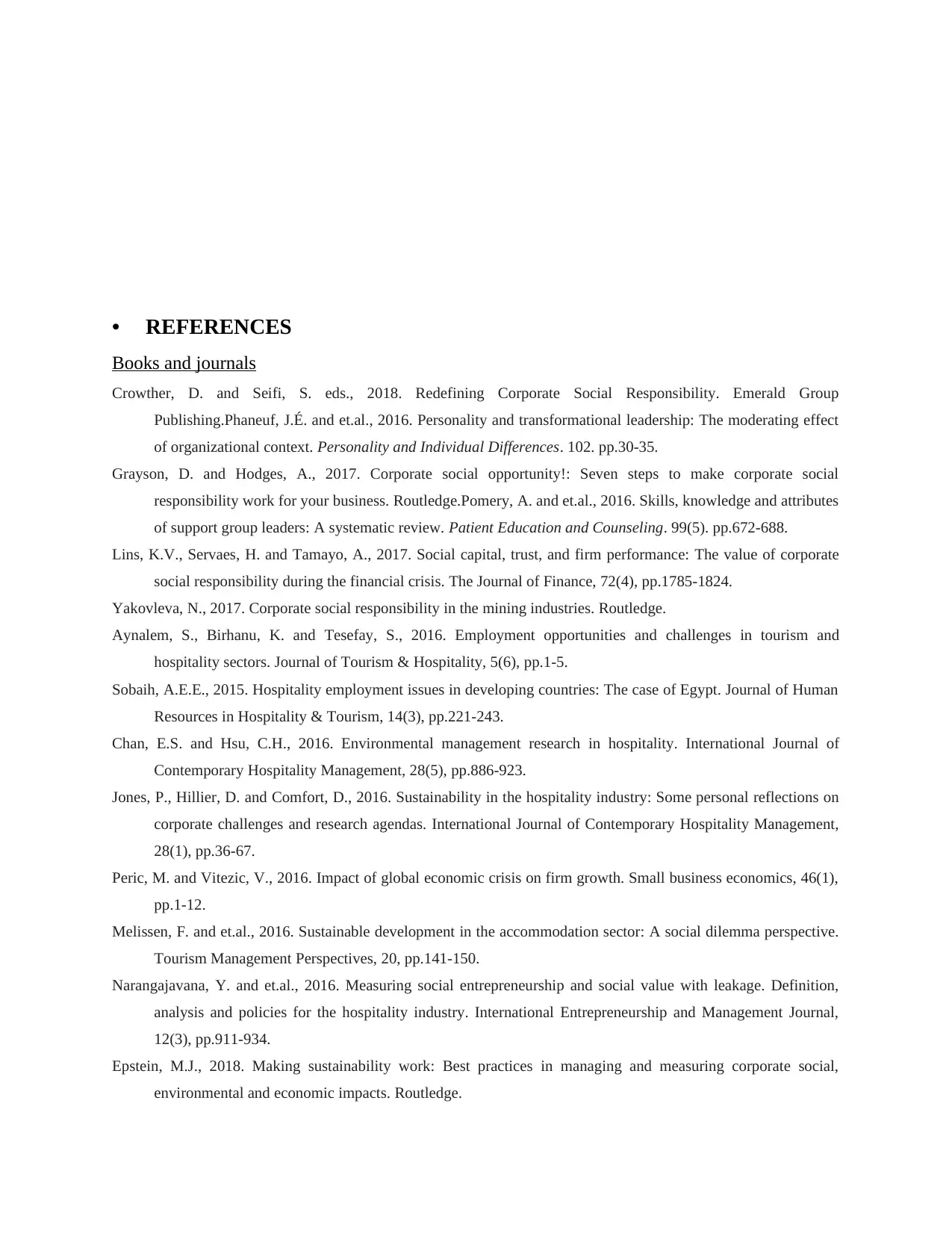
• REFERENCES
Books and journals
Crowther, D. and Seifi, S. eds., 2018. Redefining Corporate Social Responsibility. Emerald Group
Publishing.Phaneuf, J.É. and et.al., 2016. Personality and transformational leadership: The moderating effect
of organizational context. Personality and Individual Differences. 102. pp.30-35.
Grayson, D. and Hodges, A., 2017. Corporate social opportunity!: Seven steps to make corporate social
responsibility work for your business. Routledge.Pomery, A. and et.al., 2016. Skills, knowledge and attributes
of support group leaders: A systematic review. Patient Education and Counseling. 99(5). pp.672-688.
Lins, K.V., Servaes, H. and Tamayo, A., 2017. Social capital, trust, and firm performance: The value of corporate
social responsibility during the financial crisis. The Journal of Finance, 72(4), pp.1785-1824.
Yakovleva, N., 2017. Corporate social responsibility in the mining industries. Routledge.
Aynalem, S., Birhanu, K. and Tesefay, S., 2016. Employment opportunities and challenges in tourism and
hospitality sectors. Journal of Tourism & Hospitality, 5(6), pp.1-5.
Sobaih, A.E.E., 2015. Hospitality employment issues in developing countries: The case of Egypt. Journal of Human
Resources in Hospitality & Tourism, 14(3), pp.221-243.
Chan, E.S. and Hsu, C.H., 2016. Environmental management research in hospitality. International Journal of
Contemporary Hospitality Management, 28(5), pp.886-923.
Jones, P., Hillier, D. and Comfort, D., 2016. Sustainability in the hospitality industry: Some personal reflections on
corporate challenges and research agendas. International Journal of Contemporary Hospitality Management,
28(1), pp.36-67.
Peric, M. and Vitezic, V., 2016. Impact of global economic crisis on firm growth. Small business economics, 46(1),
pp.1-12.
Melissen, F. and et.al., 2016. Sustainable development in the accommodation sector: A social dilemma perspective.
Tourism Management Perspectives, 20, pp.141-150.
Narangajavana, Y. and et.al., 2016. Measuring social entrepreneurship and social value with leakage. Definition,
analysis and policies for the hospitality industry. International Entrepreneurship and Management Journal,
12(3), pp.911-934.
Epstein, M.J., 2018. Making sustainability work: Best practices in managing and measuring corporate social,
environmental and economic impacts. Routledge.
Books and journals
Crowther, D. and Seifi, S. eds., 2018. Redefining Corporate Social Responsibility. Emerald Group
Publishing.Phaneuf, J.É. and et.al., 2016. Personality and transformational leadership: The moderating effect
of organizational context. Personality and Individual Differences. 102. pp.30-35.
Grayson, D. and Hodges, A., 2017. Corporate social opportunity!: Seven steps to make corporate social
responsibility work for your business. Routledge.Pomery, A. and et.al., 2016. Skills, knowledge and attributes
of support group leaders: A systematic review. Patient Education and Counseling. 99(5). pp.672-688.
Lins, K.V., Servaes, H. and Tamayo, A., 2017. Social capital, trust, and firm performance: The value of corporate
social responsibility during the financial crisis. The Journal of Finance, 72(4), pp.1785-1824.
Yakovleva, N., 2017. Corporate social responsibility in the mining industries. Routledge.
Aynalem, S., Birhanu, K. and Tesefay, S., 2016. Employment opportunities and challenges in tourism and
hospitality sectors. Journal of Tourism & Hospitality, 5(6), pp.1-5.
Sobaih, A.E.E., 2015. Hospitality employment issues in developing countries: The case of Egypt. Journal of Human
Resources in Hospitality & Tourism, 14(3), pp.221-243.
Chan, E.S. and Hsu, C.H., 2016. Environmental management research in hospitality. International Journal of
Contemporary Hospitality Management, 28(5), pp.886-923.
Jones, P., Hillier, D. and Comfort, D., 2016. Sustainability in the hospitality industry: Some personal reflections on
corporate challenges and research agendas. International Journal of Contemporary Hospitality Management,
28(1), pp.36-67.
Peric, M. and Vitezic, V., 2016. Impact of global economic crisis on firm growth. Small business economics, 46(1),
pp.1-12.
Melissen, F. and et.al., 2016. Sustainable development in the accommodation sector: A social dilemma perspective.
Tourism Management Perspectives, 20, pp.141-150.
Narangajavana, Y. and et.al., 2016. Measuring social entrepreneurship and social value with leakage. Definition,
analysis and policies for the hospitality industry. International Entrepreneurship and Management Journal,
12(3), pp.911-934.
Epstein, M.J., 2018. Making sustainability work: Best practices in managing and measuring corporate social,
environmental and economic impacts. Routledge.
⊘ This is a preview!⊘
Do you want full access?
Subscribe today to unlock all pages.

Trusted by 1+ million students worldwide

Crane, A., Matten, D. and Spence, L. eds., 2019. Corporate social responsibility: Readings and cases in a global
context. Routledge.
context. Routledge.
1 out of 10
Related Documents
Your All-in-One AI-Powered Toolkit for Academic Success.
+13062052269
info@desklib.com
Available 24*7 on WhatsApp / Email
![[object Object]](/_next/static/media/star-bottom.7253800d.svg)
Unlock your academic potential
Copyright © 2020–2025 A2Z Services. All Rights Reserved. Developed and managed by ZUCOL.





